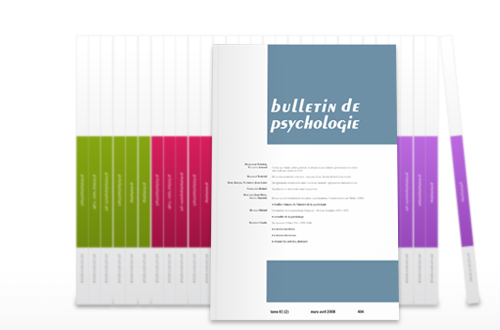

une documentation irremplaçable, avec des recensions
d’ouvrages et d’articles de revues.


• Dossier : Hommage Ă GĂ©rard Vergnaud : la conceptualisation dans l'action
Bulletin de psycohologie (La Rédaction).— Hommage à Gérard Vergnaud (1933-2021), Bulletin de psychologie, Tome 75 (4), N°578, 2022, p. 269-270.
Weil-Barais (Annick), Vinatier (Isabelle).— Présentation du dossier « Hommage à Gérard Vergnaud : la conceptualisation dans l'action », Bulletin de psychologie, Tome 75 (4), N°578, 2022, p. 271-272.
Rogalski (Janine).— Gérard Vergnaud, un demi-siècle de compagnonnage scientifique, militant, amical, Bulletin de psychologie, Tome 75 (4), N°578, 2022, p. 273-276.
Résumé : Janine Rogalski témoigne de son compagnonnage scientifique avec Gérard Vergnaud au sein du Centre national de la recherche scientifique, pendant quarante ans. Elle évoque les conditions de travail de l’époque favorables à l’interdisciplinarité, aux échanges et au travail collectif.
Title: GĂ©rard Vergnaud, half a century of academic, activist, and friendly companionship
Abstract: Rogalski recalls her academic companionship with GĂ©rard Vergnaud within the French National Center for Scientific Research, over a period of forty years. She describes the working conditions of the time, which promoted interdisciplinarity, exchanges, and collective work.
Richard (Jean-François).— Gérard Vergnaud : le choix de l’action, Bulletin de psychologie, Tome 75 (4), N°578, 2022, p. 277-281.
Résumé : L’auteur – contemporain de Gérard Vergnaud – témoigne du caractère innovant de son œuvre, notamment dans le domaine de l’apprentissage des mathématiques. Il interroge les raisons du renoncement et du désintérêt de Gérard Vergnaud pour la formalisation du fonctionnement de la pensée dont il défend la pertinence.
Title: The choice of action
Abstract: The author—a contemporary of Gérard Vergnaud—bears witness to the innovative character of his work, particularly in the field of learning mathematics. He explores the reasons for Gérard Vergnaud’s renunciation and lack of interest in the formalization of the functioning of thought, the relevance of which he defends.
Weil-Barais (Annick), Numa Bocage (Line), Pagoni (Maria).— Gérard Vergnaud : un chercheur engagé, une contribution théorique d’actualité, Bulletin de psychologie, Tome 75 (4), N°578, 2022, p. 283-291.
Résumé : À partir de leur longue fréquentation académique et amicale avec Gérard Vergnaud, les autrices évoquent ses orientations et engagements scientifiques dans le champ de l’éducation et de la formation, sa contribution à la théorisation du fonctionnement cognitif, du développement intellectuel et des apprentissages, ainsi que l’importance qu’il accordait aux analyses épistémologiques. Elles relèvent l’originalité, l’apport et l’actualité de sa pensée pour une recherche engagée au service des plus vulnérables (les enfants et les adolescents, les travailleurs de bas niveau de qualification) et des professionnels de l’éducation et de la formation.
Title: GĂ©rard Vergnaud: A committed researcher, a topical theoretical contribution
Abstract: Based on their long academic and friendly relationship with GĂ©rard Vergnaud, the authors describe his scientific orientations and commitments in the field of education and training, his contribution to the theorization of cognitive functioning, intellectual development, and learning, as well as the importance he attached to epistemological analyses. They highlight the originality, the contribution, and the topicality of his thought for a research committed to serving the most vulnerable (children and adolescents, low-qualified workers) and professionals in education and training.
Vinatier (Isabelle), Weil-Barais (Annick).— Les thèses encadrées par Gérard Vergnaud, Bulletin de psychologie, Tome 75 (4), N°578, 2022, p. 293-302.
Résumé : Cet article présente une analyse thématique des thèses dirigées par Gérard Vergnaud, dont les résumés ont été collectés sur les sites officiels répertoriant les thèses soutenues en France.
Title: Theses supervised by GĂ©rard Vergnaud
Abstract: This article presents a thematic analysis of the theses supervised by GĂ©rard Vergnaud, the summaries of which have been collected from the official sites listing theses defended in France.
Vinatier (Isabelle), Weil-Barais (Annick).— Gérard Vergnaud : un directeur de thèse peu commun, mais pas seulement, Bulletin de psychologie, Tome 75 (4), N°578, 2022, p. 303-309.
Résumé : Cet article présente un portrait de Gérard Vergnaud construit à partir de témoignages d’anciens thésards.
Title: GĂ©rard Vergnaud: An unusual thesis supervisor, but not only that
Abstract: This article presents a portrait of GĂ©rard Vergnaud built from testimonies of his former PhD students.
Vinatier (Isabelle), Delacour (Gérard).— De la théorie de l’activité de Gérard Vergnaud au champ théorique de la didactique professionnelle, Bulletin de psychologie, Tome 75 (4), N°578, 2022, p. 311-321.
Résumé : Sous la houlette de Gérard Vergnaud un champ nouveau de recherches est né à partir des années 1980 : celui de la didactique professionnelle. Après avoir restitué à grands traits le récit de ses commencements et fait droit à l’effervescence intellectuelle qui a marqué et permis son émergence, nous présentons quelques principes fondateurs de ses principaux concepteurs : Gérard Vergnaud, certes, mais aussi Pierre Rabardel, Renan Samurçay et Pierre Pastré.
Title: From Gérard Vergnaud’s theory of activity to the theoretical field of professional didactics
Abstract: Under the leadership of Gérard Vergnaud, a new field of research was born in the 1980s: that of professional didactics. After covering in broad strokes the story of its beginnings and honoring the intellectual effervescence that marked and enabled its emergence, we will present some founding principles of its main designers: Gérard Vergnaud first of all, but also Pierre Rabardel, Renan Samurçay, and Pierre Pastré.
Delacour (Gérard), Vinatier (Isabelle).— Du couple conceptuel « situation/schème » (Gérard Vergnaud) à celui de « structure conceptuelle de la situation/modèle opératif du sujet » (Pierre Pastré), Bulletin de psychologie, Tome 75 (4), N°578, 2022, p. 323-332.
Résumé : Pierre Pastré, dans sa théorie de la didactique professionnelle, fonde sa notion de « conceptualisation dans l’action » sur la théorie de l’activité de Gérard Vergnaud. Pour comprendre le développement professionnel d’opérateurs sur le terrain des interactions homme-machine, il substitue au couple conceptuel « schème/situation » de Vergnaud, celui de « structure conceptuelle de la situation/modèle opératif du sujet ». D’une théorie à une autre, dans quelle mesure y a-t-il continuité ou rupture ? Qu’en est-il, alors, des compatibilités épistémologiques entre les deux ? Est-il si sûr qu’il existe entre les deux un même entendement de la notion de « conceptualisation dans l’action » ? La transition d’un couple conceptuel à l’autre se trouve également interrogée à travers les terrains de recherche des auteurs. L’article montre ainsi que la puissance de la théorie de Gérard Vergnaud s’exprime non seulement par sa capacité à féconder une diversité de terrains de recherche, mais aussi par son ouverture à des complémentarités ou des adaptations qui témoignent de sa vitalité.
Title: From the conceptual pair “situation/scheme” (Gérard Vergnaud) to that of “conceptual structure of the situation/operational model of the subject” (Pierre Pastré)
Abstract: Pierre Pastré, in his theory of professional didactics, bases his notion of “conceptualization in action” on Gérard Vergnaud’s theory of activity. To understand the professional development of operators in the field of human-machine interactions, he substitutes Vergnaud’s conceptual pair “scheme/situation” with that of “conceptual structure of the situation/operative model of the subject.” To what extent is there continuity or rupture from one theory to the other? What, then, of the epistemological compatibility between the two? Is it certain that there is the same understanding of the notion of “conceptualization in action” between the two? This transition from one conceptual pair to another is also explored through the two authors’ research. Therefore, this article shows that the power of Gérard Vergnaud’s theory is expressed not only by its ability to fertilize a diversity of research fields, but also by its openness to complementarities or adaptations which testify to its vitality.
Vidal-Gomel (Christine), Bourmaud (Gaëtan), Munoz (Grégory).— Gérard Vergnaud et Pierre Rabardel, entre filiation et débats, une contribution à la didactique professionnelle, Bulletin de psychologie, Tome 75 (4), N°578, 2022, p. 333-346.
Résumé : Ce texte examine des filiations et des points de débat, entre la théorie des champs conceptuels de Gérard Vergnaud et le modèle des activités médiatisées par les instruments de Pierre Rabardel, puis le modèle COMPETY que ce dernier a élaboré avec Renan Samurçay. Ces éléments de discussion fournissent une occasion de mettre en perspective différentes façons de mobiliser le concept de schème et leurs conséquences, mais aussi de souligner les apports de ces deux auteurs à la didactique professionnelle.
Title: GĂ©rard Vergnaud and Pierre Rabardel, between filiation and debates, a contribution to professional didactics
Abstract: This text examines the filiations and debates between Gérard Vergnaud’s theory of conceptual fields and Pierre Rabardel’s models: instrument-mediated activities and COMPETY, developed later with Renan Samurçay. This discussion sheds light on different ways of mobilizing the concept of scheme and their consequences, but it also underlines the contributions of these two authors to professional didactics.
Gouedard (Catherine), Bationo-Tillon (Anne).— La conception du pouvoir d’agir selon Pierre Rabardel : quelles filiations conceptuelles avec Gérard Vergnaud ?, Bulletin de psychologie, Tome 75 (4), N°578, 2022, p. 347-356.
Résumé : Cet article est dédié à la mémoire de Gérard Vergnaud et de Pierre Rabardel qui ont marqué la psychologie. L’objectif est de mettre en lumière leurs filiations conceptuelles dans l’approche du pouvoir d’agir en retraçant ce qui est au cœur de la pensée scientifique, de l’un puis de l’autre, avec le souci d’en souligner les articulations. La conception du pouvoir d’agir selon Pierre Rabardel hérite, en particulier, de la relation « situation-schème » de Gérard Vergnaud qui sous-tend l’activité, et de la place centrale accordée à l’évolution structurelle des ressources du sujet. Elle introduit aussi une différence entre capacité d’agir et pouvoir d’agir. Son approche du « sujet capable » se distingue de l’empowerment dans la conception québécoise du « développement du pouvoir d’agir » (DPA).
Title: The conception of the power to act according to Pierre Rabardel: Are there any conceptual filiations with GĂ©rard Vergnaud?
Abstract: This article is dedicated to the memory of Gérard Vergnaud and Pierre Rabardel, who left a mark on psychology. The objective is to highlight their conceptual affiliations in the approach to the power to act by retracing what is at the heart of each one’s scientific thought, with the aim of underlining their connections. The conception of the power to act according to Pierre Rabardel inherits, in particular, Gérard Vergnaud’s “situation-scheme” relationship, which underlies the activity, and the central place granted to the structural evolution of the subject’s resources. It also introduces a difference between capacity to act and power to act. His approach of the “capable subject” differs from empowerment in the Quebec conception of “development of the power to act” (DPA).
Weil-Barais (Annick).— L’enfant, la mathématique et la réalité : présentation et réception du livre, Bulletin de psychologie, Tome 75 (4), N°578, 2022, p. 357-370.
Résumé : Cet article présente le livre princeps écrit par Gérard Vergnaud : son organisation ainsi que sa réception dans les champs de la psychologie et de la didactique des mathématiques.
Title: The child, mathematics and reality: Presentation and reception of the book
Abstract: This article presents the princeps book written by GĂ©rard Vergnaud: its organization as well as its reception in the fields of psychology and didactics of mathematics.